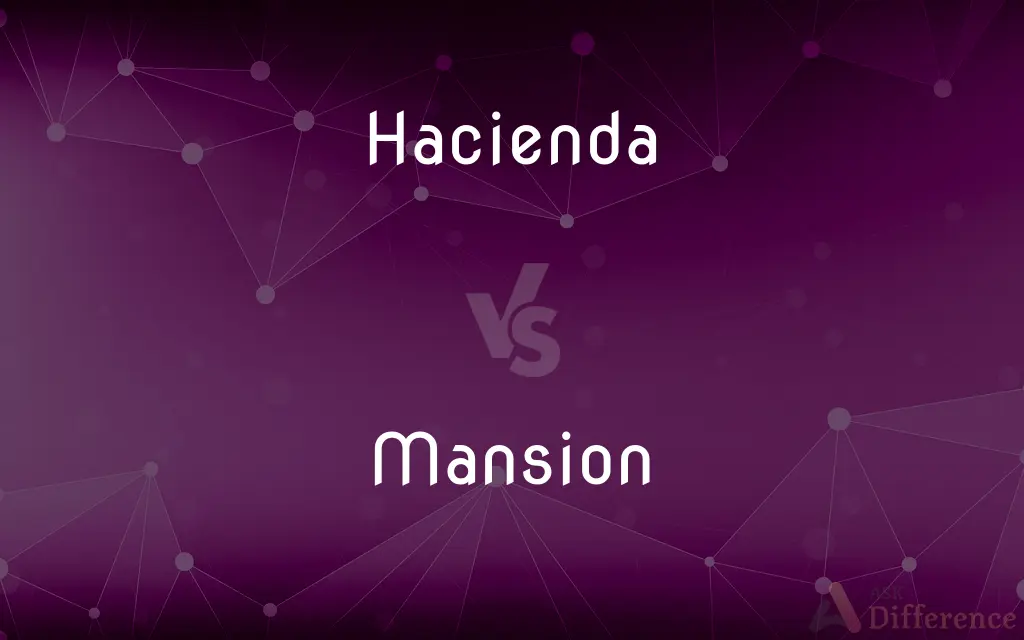Hacienda vs. Mansion — What's the Difference?
By Fiza Rafique & Urooj Arif — Updated on April 2, 2024
Haciendas are large estates with historical significance in Latin America, often linked to agriculture, while mansions are grand, luxurious residences.

Difference Between Hacienda and Mansion
Table of Contents
ADVERTISEMENT
Key Differences
A hacienda typically refers to a large estate or plantation with a dwelling house, historically found in Spanish-speaking countries, particularly in Latin America. These estates were significant in agricultural production and often included residential buildings, farming areas, and sometimes, workers' quarters. On the other hand, a mansion is a large, opulent house that symbolizes wealth and status, without a specific geographical or historical context.
Historically, haciendas played a crucial role in the colonial economy, serving as centers for agriculture, mining, or ranching, depending on the region. They were often self-sufficient communities with their own churches and markets. Mansions, however, are primarily residential and designed with luxury and comfort in mind, showcasing architectural beauty and opulence without necessarily having economic functions like those of haciendas.
The architectural styles of haciendas vary, reflecting the local culture, climate, and available materials, often with Spanish colonial influences. Mansions, conversely, can encompass a wide range of architectural styles, from Victorian and Georgian to modernist, reflecting the personal tastes of their owners and the architectural trends of their time.
In terms of their social and economic implications, haciendas were symbols of power and social hierarchy in colonial and post-colonial Latin America, often owned by the elite class. Mansions serve a similar purpose in symbolizing the wealth and status of their owners, but they are found globally and are not tied to a specific type of economy or production.
The concept of a hacienda is deeply intertwined with the history and culture of the regions where they are found, reflecting the colonial past and changes in land ownership over time. Mansions, while also carrying cultural and historical significance, are more universally recognized as symbols of wealth and luxury living, without the same depth of historical and economic context.
ADVERTISEMENT
Comparison Chart
Definition
Large estate or plantation in Spanish-speaking countries
Large, opulent house
Origin
Latin America, with historical and agricultural significance
Global, associated with residential luxury
Architectural Style
Often Spanish colonial with local influences
Varied, including Victorian, Georgian, modernist
Function
Agricultural production, self-sufficient communities
Primarily residential, symbolizing wealth and status
Cultural Significance
Reflects colonial history and social hierarchy
Symbol of wealth and luxury, varying cultural significance
Compare with Definitions
Hacienda
A large estate or plantation with historical roots in Spanish-speaking countries.
The hacienda was known for its vast sugar cane fields.
Mansion
A grand, luxurious residence, symbolizing wealth and status.
The mansion stood out with its elaborate gardens and opulent design.
Hacienda
Deeply intertwined with the history and culture of Latin America.
The hacienda has been preserved as a cultural heritage site.
Mansion
Encompasses a wide range of styles, reflecting owners' tastes.
The mansion was an exquisite example of Victorian architecture.
Hacienda
Reflects local culture and Spanish colonial influences.
The hacienda's architecture featured a large courtyard surrounded by arcades.
Mansion
Residential, designed for luxury and comfort.
The mansion's interior boasted fine art and custom furnishings.
Hacienda
Symbolized power and social hierarchy, often owned by the elite.
The hacienda owner was a prominent figure in the community.
Mansion
Found worldwide, not tied to a specific historical or economic context.
Mansions in the city are sought after by the global elite.
Hacienda
Central to the colonial economy, focusing on agriculture, mining, or ranching.
The hacienda played a pivotal role in the region's agricultural production.
Mansion
Represents the financial success and social status of its owners.
Owning a mansion in that neighborhood was a mark of high social standing.
Hacienda
A hacienda (UK: or US: ; Spanish: [aˈθjenda] or [aˈsjenda]), in the colonies of the Spanish Empire, is an estate (or finca), similar to a Roman latifundium. Some haciendas were plantations, mines or factories.
Mansion
A mansion is a large dwelling house. The word itself derives through Old French from the Latin word mansio "dwelling", an abstract noun derived from the verb manere "to dwell".
Hacienda
A large estate in a Spanish-speaking region.
Mansion
A large, impressive house.
Hacienda
The house of the owner of such an estate.
Mansion
A large stately house.
Hacienda
A large homestead in a ranch or estate usually in places where Colonial Spanish culture has had architectural influence.
Mansion
A manor house.
Hacienda
A large estate where work of any kind is done, as agriculture, manufacturing, mining, or raising of animals; a cultivated farm, with a good house, in distinction from a farming establishment with rude huts for herdsmen, etc.; - a word used in Spanish-American regions.
Mansion
A dwelling; an abode.
Hacienda
The main residence of a hacienda{1}.
Mansion
A separate dwelling in a large house or structure.
Hacienda
A large estate in Spanish-speaking countries
Mansion
See house.
Hacienda
The main house on a ranch or large estate
Mansion
Any one of the 28 divisions of the moon's monthly path.
Mansion
A large house or building, usually built for the wealthy.
Mansion
(UK) A luxurious flat (apartment).
Mansion
An apartment building.
Mansion
(obsolete) A house provided for a clergyman; a manse.
Mansion
(obsolete) A stopping-place during a journey; a stage.
Mansion
(historical) An astrological house; a station of the moon.
Mansion
(Chinese astronomy) One of twenty-eight sections of the sky.
Mansion
An individual habitation or apartment within a large house or group of buildings. (Now chiefly in allusion to John 14:2.)
Mansion
Any of the branches of the Rastafari movement.
Mansion
A dwelling place, - whether a part or whole of a house or other shelter.
In my Father's house are many mansions.
These poets near our princes sleep,And in one grave their mansions keep.
Mansion
The house of the lord of a manor; a manor house; hence: Any house of considerable size or pretension.
Mansion
A twelfth part of the heavens; a house. See 1st House, 8.
Mansion
The place in the heavens occupied each day by the moon in its monthly revolution.
The eight and twenty mansionsThat longen to the moon.
Mansion
To dwell; to reside.
Mansion
(astrology) one of 12 equal areas into which the zodiac is divided
Mansion
A large and imposing house
Common Curiosities
What distinguishes a hacienda from a mansion?
A hacienda is a large estate with historical and agricultural significance in Latin America, whereas a mansion is a grand residence emphasizing luxury.
Can a hacienda be considered a mansion?
While a hacienda may have a luxurious main house, its historical and agricultural roles distinguish it from a mansion's primarily residential luxury.
What is the historical significance of haciendas?
Haciendas were central to the colonial economy and social hierarchy in Latin America, reflecting the region's colonial past.
What architectural styles are common for haciendas?
Haciendas often feature Spanish colonial architecture with local influences.
What does owning a mansion symbolize?
It symbolizes wealth, status, and sometimes, architectural taste or cultural significance.
Can the architecture of a mansion reflect historical periods?
Yes, mansions often reflect the architectural styles and trends of the periods in which they were built.
Are mansions always luxurious?
Yes, the term mansion implies a level of luxury and grandeur in residential living.
What factors influence the architectural design of a mansion?
Factors include the owner's personal taste, the intended statement of wealth and status, and sometimes historical preservation.
How are mansions integrated into urban vs. rural settings?
In urban settings, mansions might be symbols of heritage and luxury amidst modern development, while in rural settings, they often boast extensive grounds and privacy.
Do haciendas still exist today?
Yes, many have been preserved as cultural heritage sites or converted into hotels and museums.
How do the functions of haciendas and mansions differ?
Haciendas were economic units, often self-sufficient, while mansions are primarily residential and designed for luxury.
How do haciendas contribute to local culture?
They are integral to understanding the colonial history, economy, and social structures of their regions.
What role did haciendas play in agriculture?
They were pivotal in agricultural production, often focusing on specific crops like sugar, coffee, or cotton.
Is there a modern equivalent to haciendas?
While modern agricultural enterprises may fulfill similar economic roles, they lack the historical and cultural significance of traditional haciendas.
How have perceptions of haciendas and mansions evolved?
While both have historically symbolized wealth and status, contemporary views also consider their cultural, historical, and environmental impacts.
Share Your Discovery

Previous Comparison
Brave vs. Courageous
Next Comparison
Sinewy vs. MuscleAuthor Spotlight
Written by
Fiza RafiqueFiza Rafique is a skilled content writer at AskDifference.com, where she meticulously refines and enhances written pieces. Drawing from her vast editorial expertise, Fiza ensures clarity, accuracy, and precision in every article. Passionate about language, she continually seeks to elevate the quality of content for readers worldwide.
Co-written by
Urooj ArifUrooj is a skilled content writer at Ask Difference, known for her exceptional ability to simplify complex topics into engaging and informative content. With a passion for research and a flair for clear, concise writing, she consistently delivers articles that resonate with our diverse audience.














































